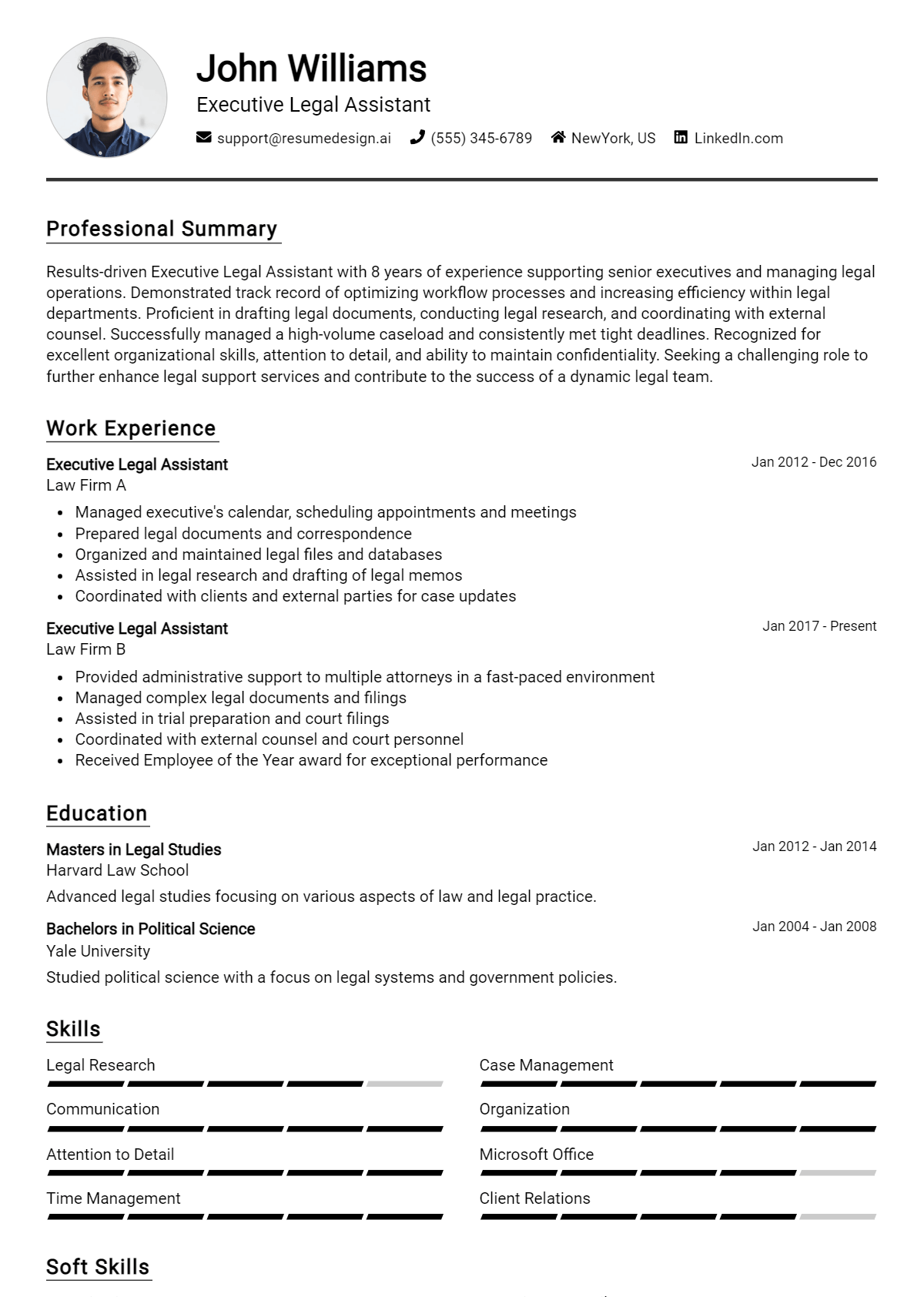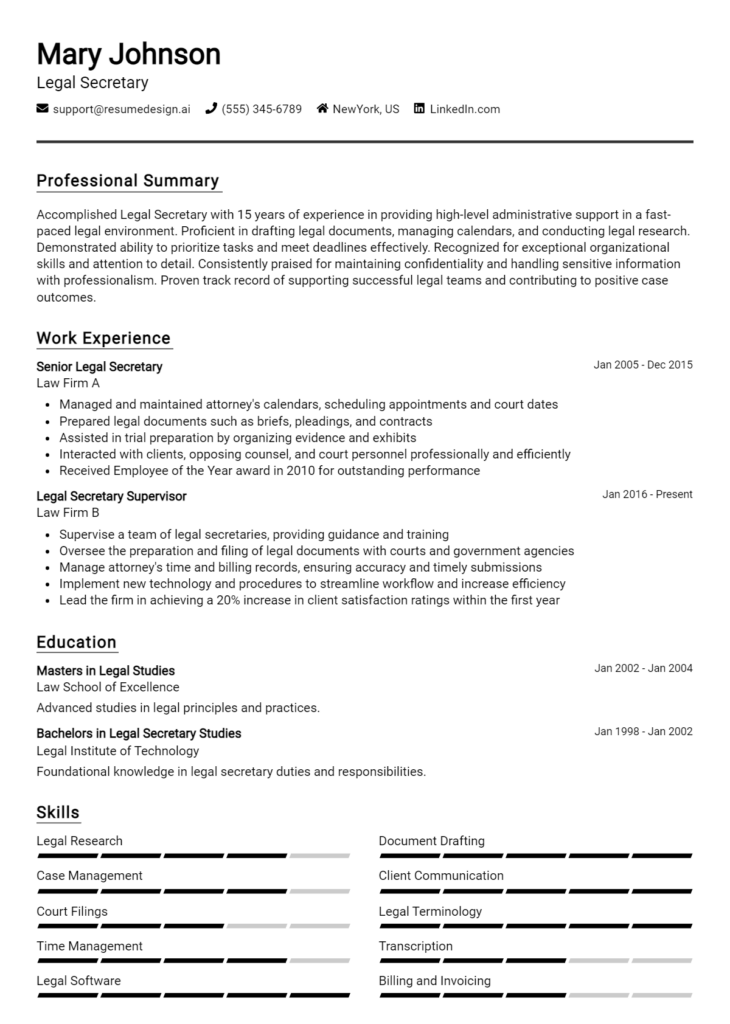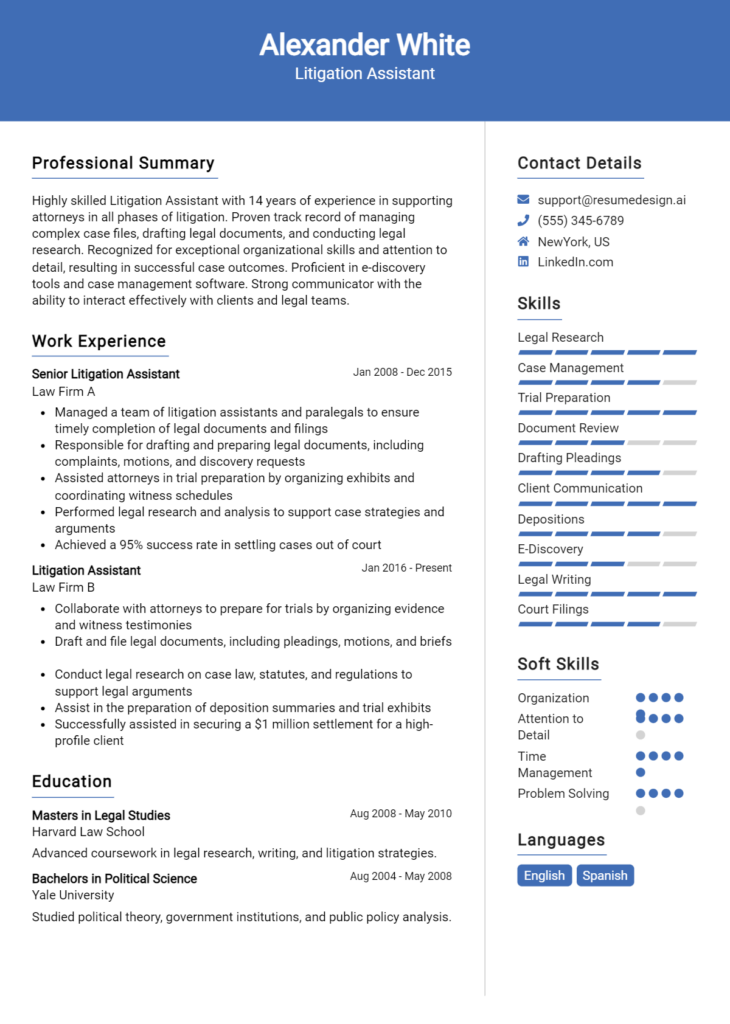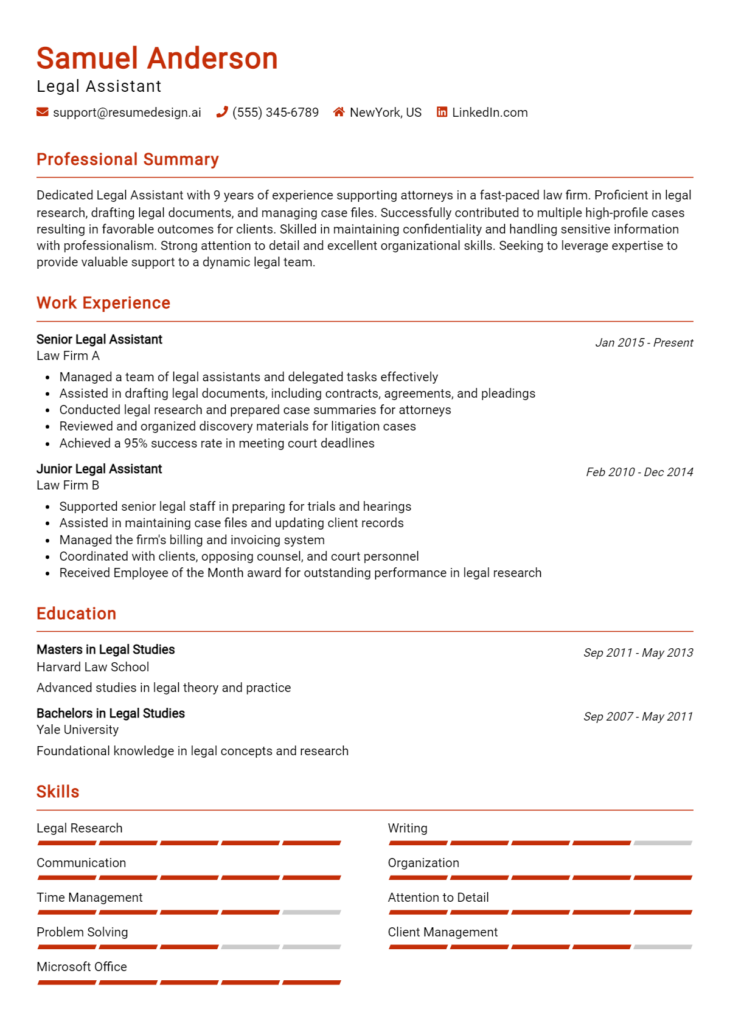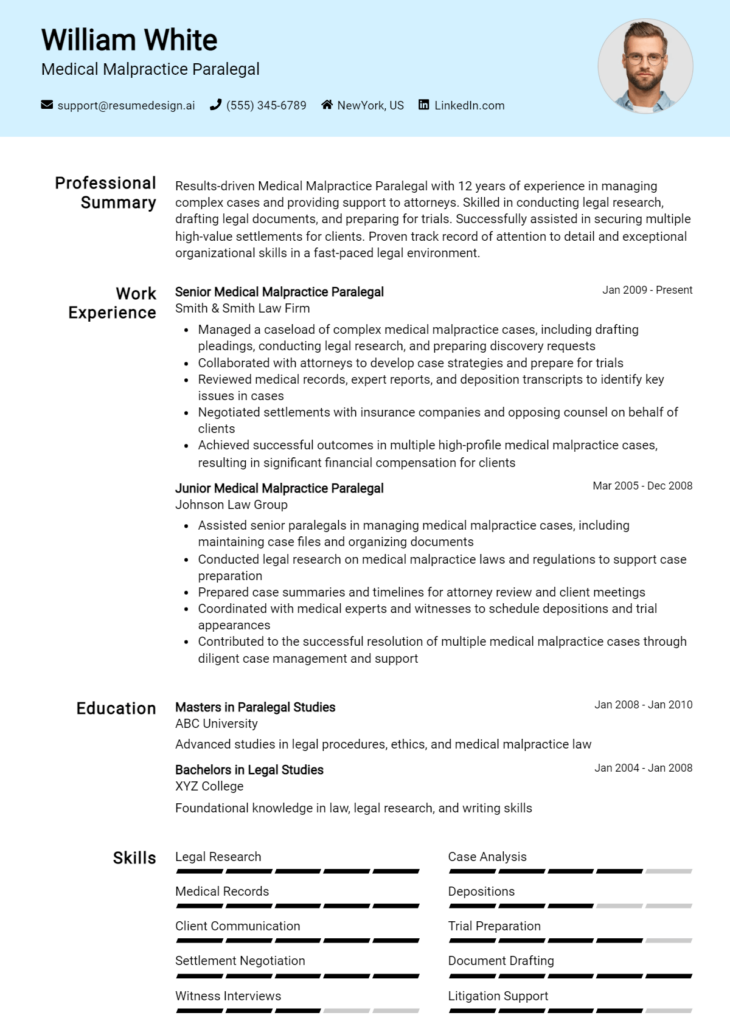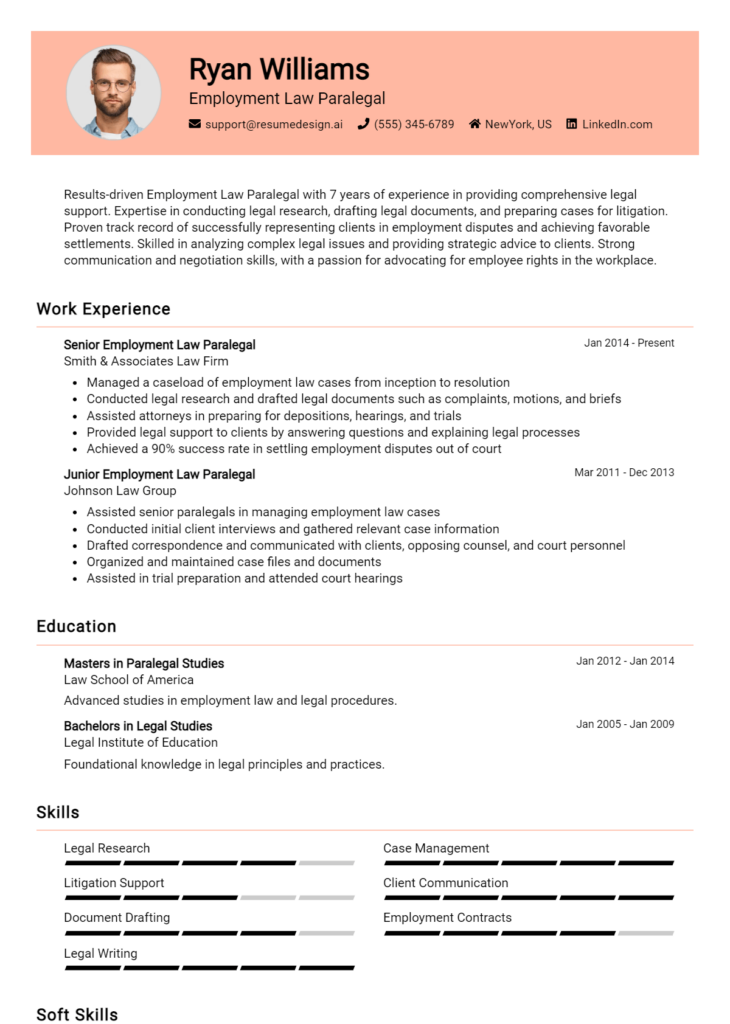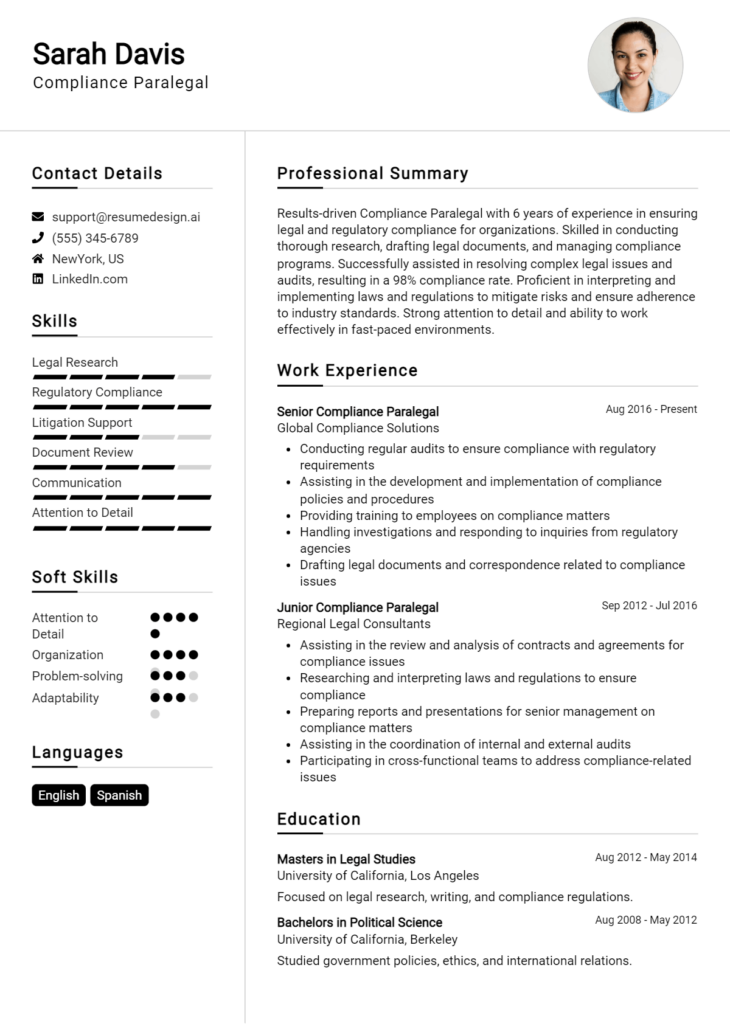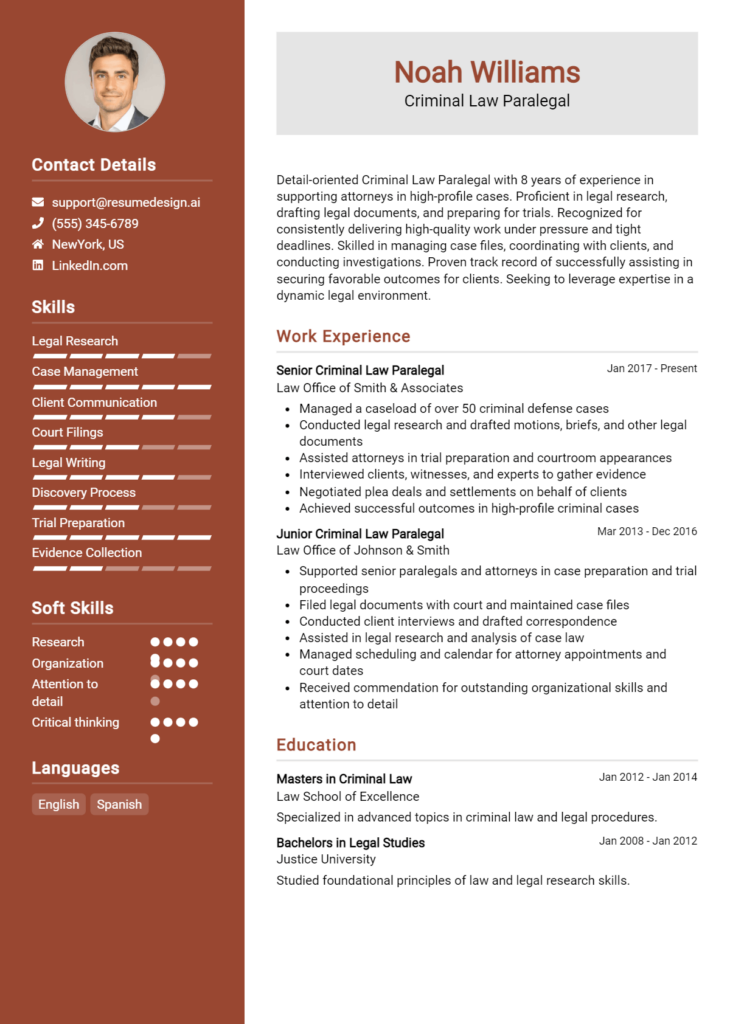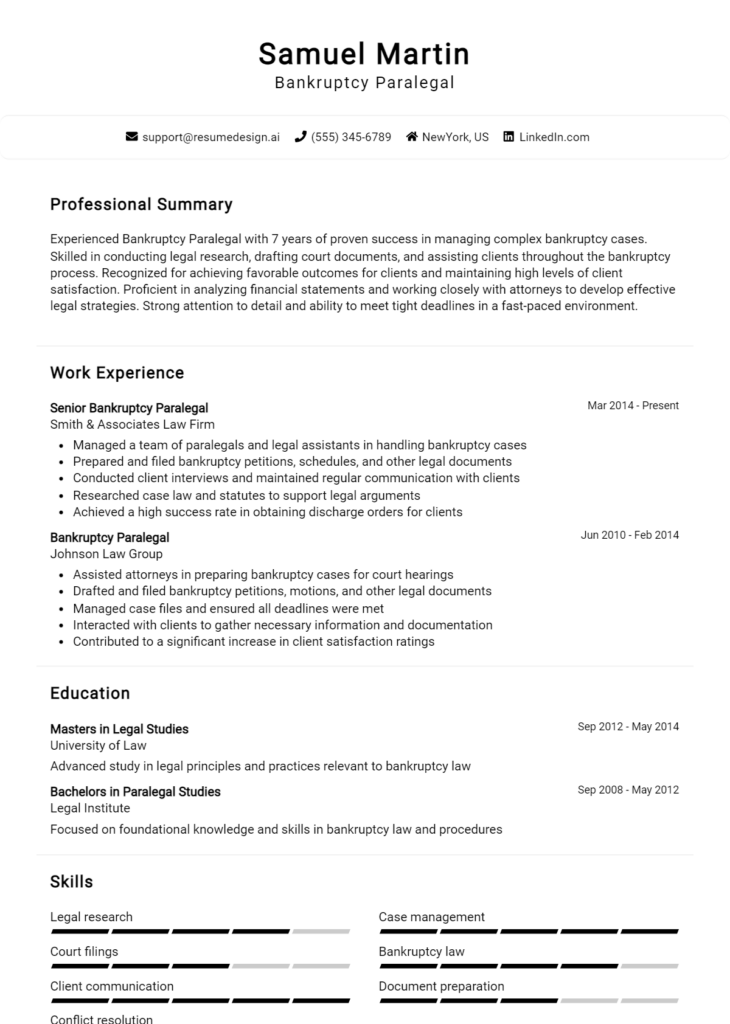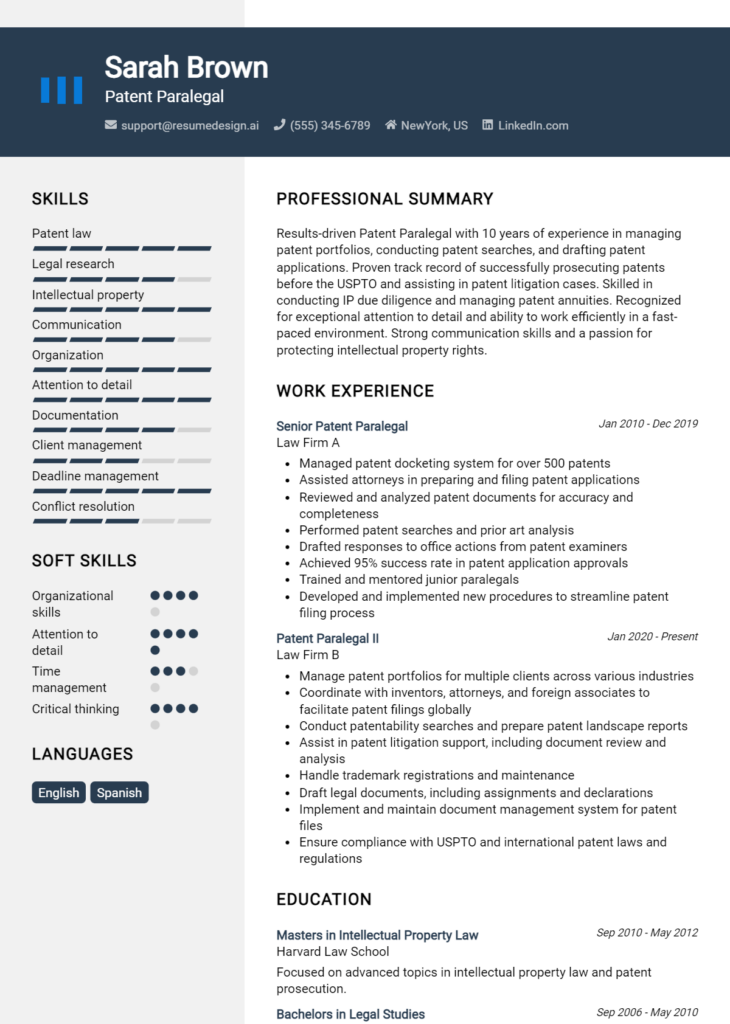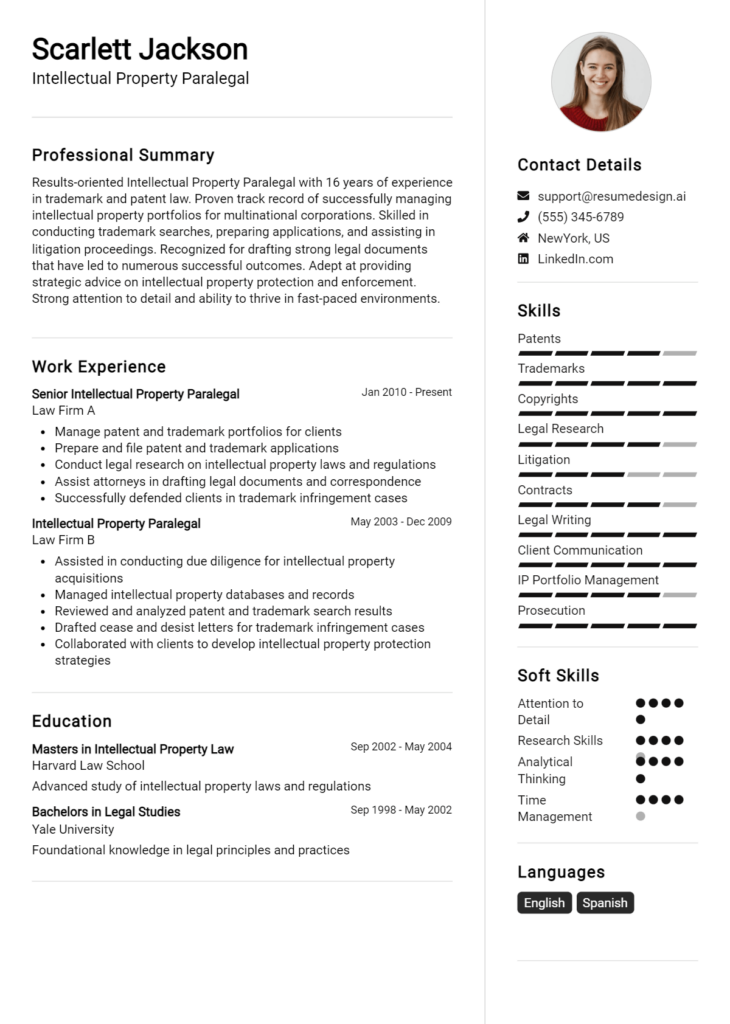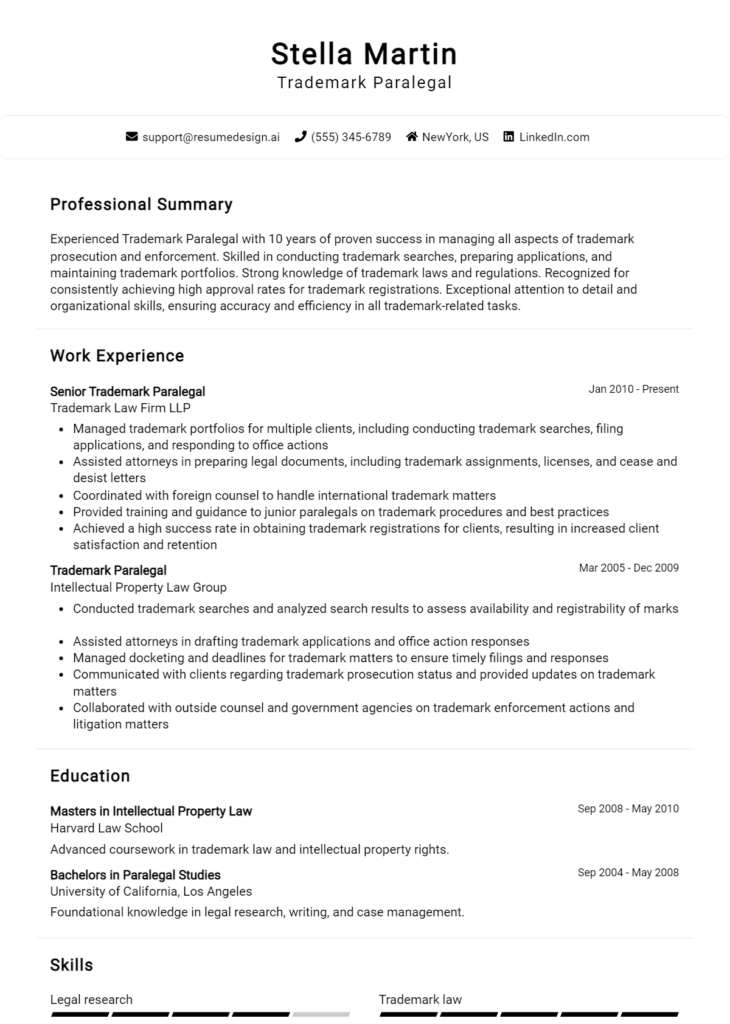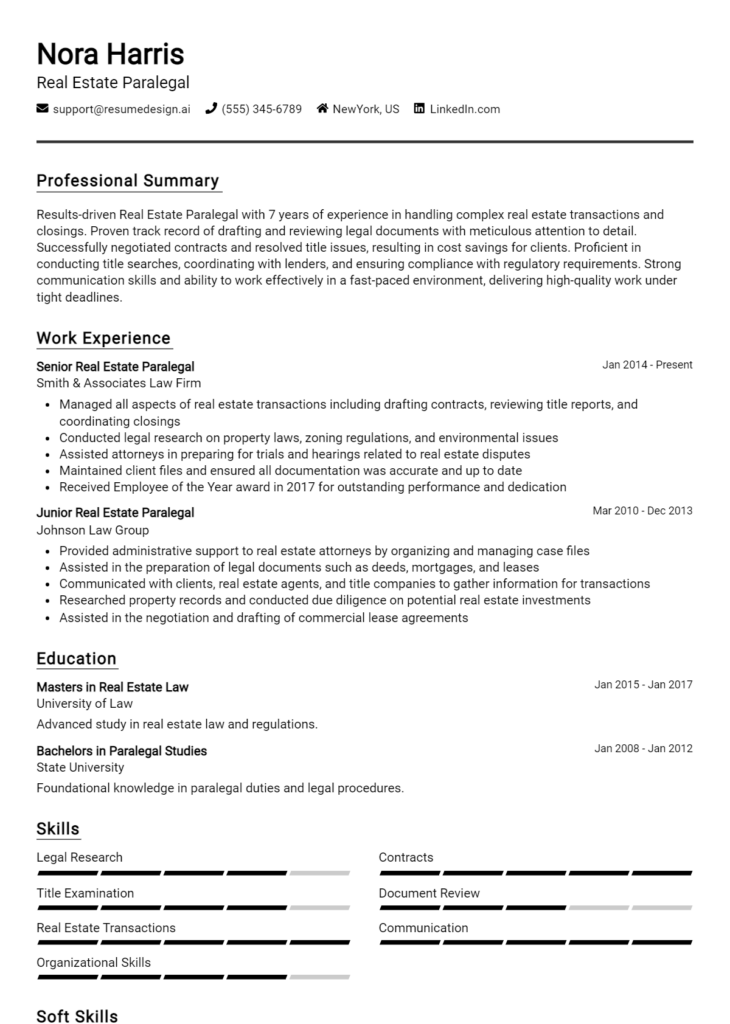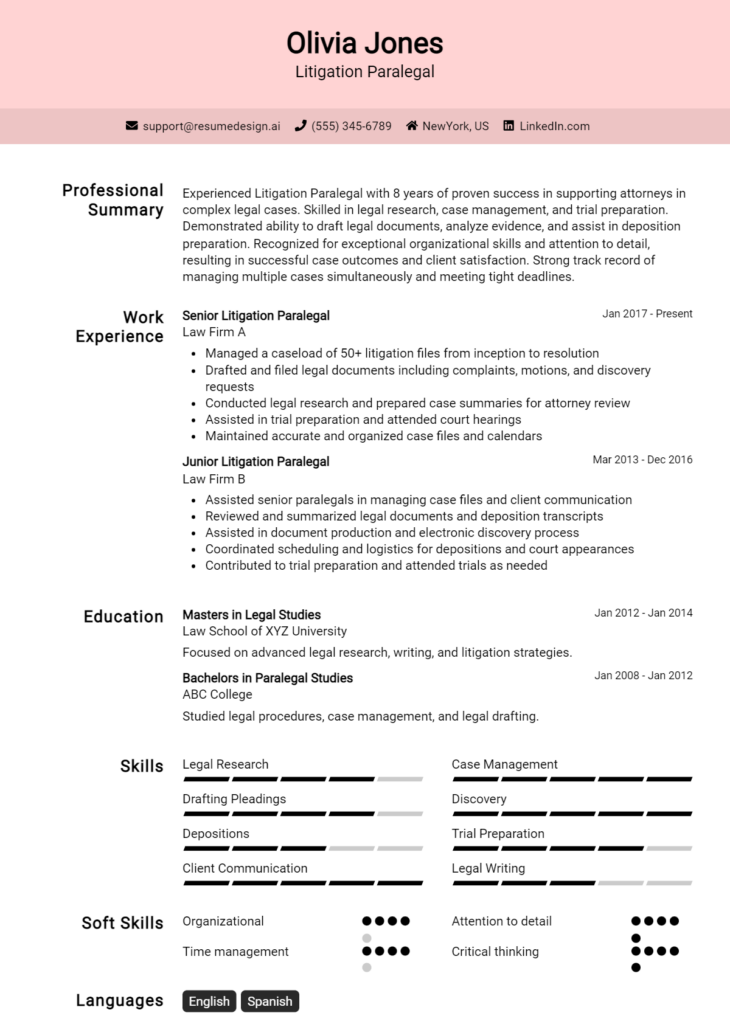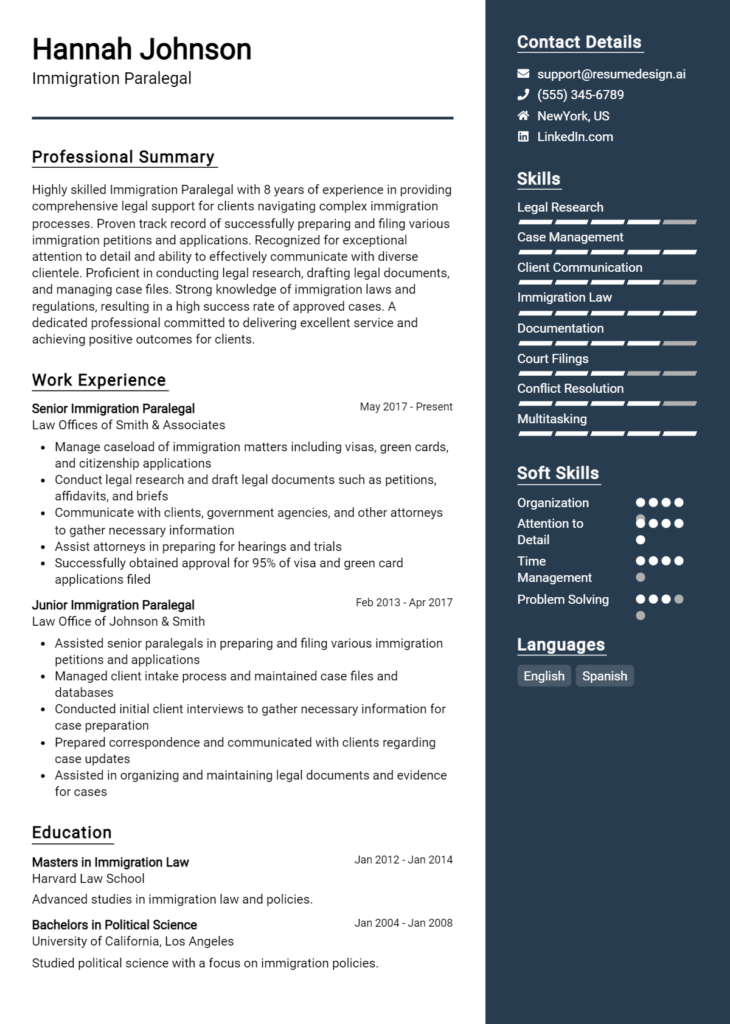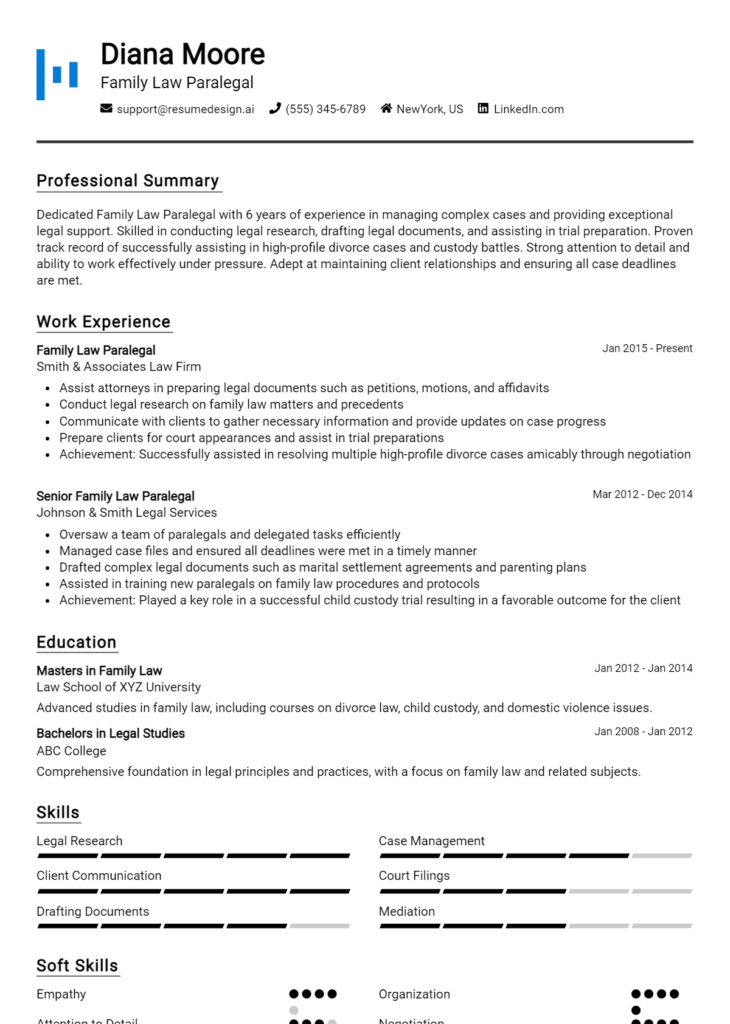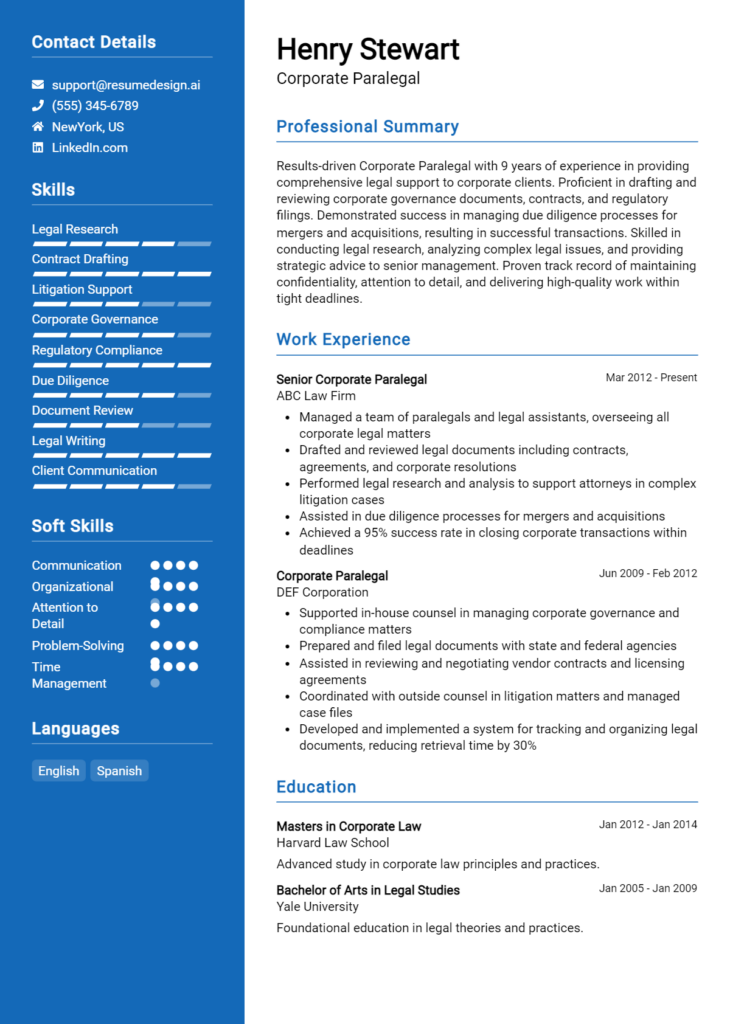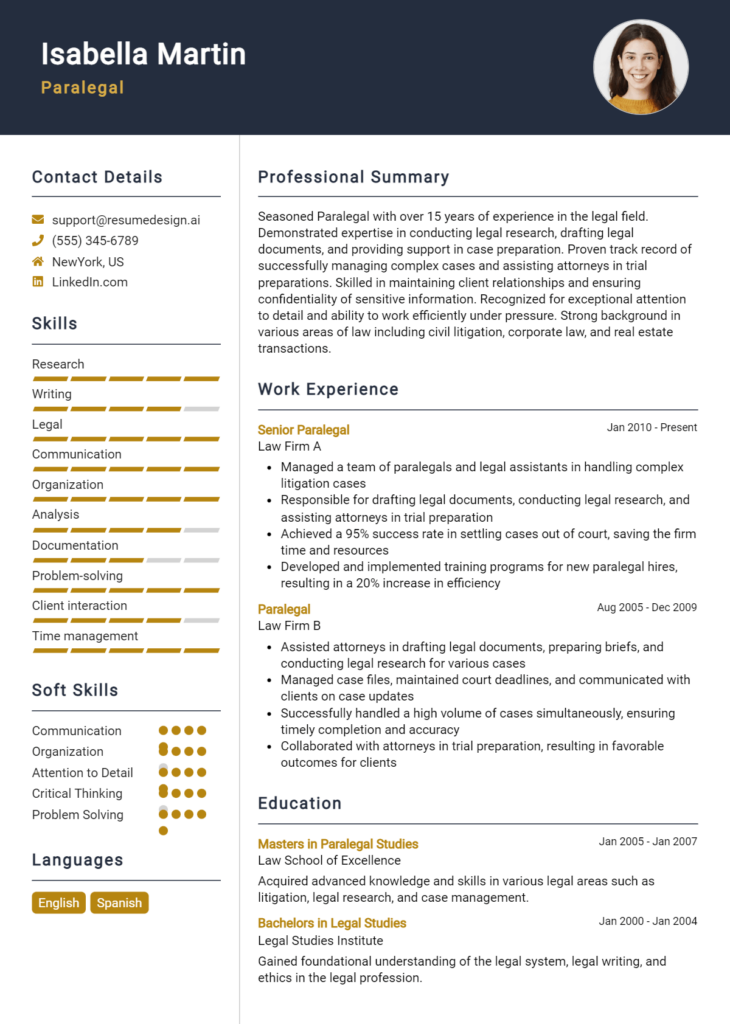Executive Legal Assistant Core Responsibilities
The role of an Executive Legal Assistant is pivotal in enhancing the efficiency of legal operations within an organization. Key responsibilities include managing legal documents, coordinating communications between departments, and maintaining schedules for attorneys. Successful candidates must possess strong technical skills, operational proficiency, and exceptional problem-solving abilities to bridge the gap between various functions. These skills not only contribute to seamless legal processes but also align with the organization's overall objectives. A well-structured resume can effectively highlight these competencies, showcasing a candidate’s qualifications to potential employers.
Common Responsibilities Listed on Executive Legal Assistant Resume
- Drafting and reviewing legal documents and correspondence
- Coordinating schedules and appointments for legal executives
- Maintaining and organizing case files and records
- Conducting legal research and compiling findings
- Facilitating communication between clients, attorneys, and other departments
- Assisting in the preparation for court appearances and trials
- Managing billing and invoicing for legal services
- Ensuring compliance with legal and regulatory requirements
- Updating and maintaining legal databases and software
- Handling confidential information with discretion and integrity
- Providing administrative support to legal teams as needed
High-Level Resume Tips for Executive Legal Assistant Professionals
A well-crafted resume is crucial for Executive Legal Assistant professionals seeking to make a lasting impression on potential employers. As the first point of contact between a candidate and a hiring manager, your resume serves as a powerful marketing tool that showcases your skills, achievements, and relevance to the position. In a competitive job market, it is essential to convey not only your qualifications but also your unique contributions to previous roles. This guide will provide practical and actionable resume tips specifically tailored for Executive Legal Assistant professionals, ensuring that your resume stands out in a crowded field.
Top Resume Tips for Executive Legal Assistant Professionals
- Tailor your resume to the specific job description by incorporating relevant keywords and phrases that align with the employer's expectations.
- Highlight your legal knowledge and familiarity with legal terminology, processes, and documentation to demonstrate your expertise in the field.
- Showcase relevant experience by detailing your responsibilities in previous roles, particularly those that align with executive support and legal assistance.
- Quantify your achievements by including metrics, such as the number of cases managed or improvements in efficiency, to provide concrete evidence of your contributions.
- Emphasize your organizational and time-management skills, as these are critical for managing the demands of busy legal environments.
- Include any specialized software skills, such as proficiency in legal research tools or document management systems, to highlight your technical capabilities.
- Incorporate professional development activities, such as relevant certifications or continuing education, to demonstrate your commitment to the field.
- Utilize a clean, professional format that enhances readability and allows your key information to stand out.
- Proofread carefully to eliminate any grammatical errors or typos, as attention to detail is a vital skill for any legal assistant.
By implementing these tips, you can significantly increase your chances of landing a job in the Executive Legal Assistant field. A resume that effectively showcases your qualifications and aligns with the specific needs of potential employers will help you stand out, making it more likely that you'll secure an interview and take the next step in your legal career.
Why Resume Headlines & Titles are Important for Executive Legal Assistant
In the competitive field of legal assistance, the role of an Executive Legal Assistant is pivotal, requiring a blend of organizational prowess, legal knowledge, and interpersonal skills. A well-crafted resume headline or title serves as the first impression a candidate makes on hiring managers, encapsulating their key qualifications in a succinct and impactful phrase. A strong headline not only grabs attention but also provides a clear snapshot of the candidate's abilities and relevance to the position being applied for. It should be concise, relevant, and tailored specifically to the job, effectively setting the tone for the rest of the resume.
Best Practices for Crafting Resume Headlines for Executive Legal Assistant
- Keep it concise: Aim for a headline that is brief yet informative, ideally one sentence or phrase.
- Be role-specific: Tailor the headline to reflect the specific role of an Executive Legal Assistant.
- Highlight key skills: Incorporate essential skills and qualifications that align with the job description.
- Use strong action words: Begin with powerful verbs that convey confidence and capability.
- Focus on accomplishments: If possible, include quantifiable achievements to demonstrate your impact.
- Maintain professionalism: Use formal language that resonates with the legal industry.
- Avoid jargon: Ensure the language is clear and understandable, avoiding overly technical terms unless necessary.
- Reflect your personality: Infuse a bit of personal branding to distinguish yourself from other candidates.
Example Resume Headlines for Executive Legal Assistant
Strong Resume Headlines
Dynamic Executive Legal Assistant with 7+ Years of Experience in Corporate Law
Results-Driven Legal Professional Specializing in Document Management and Client Relations
Detail-Oriented Executive Legal Assistant with Proven Track Record in Case Preparation
Skilled Legal Assistant with Expertise in Litigation Support and Regulatory Compliance
Weak Resume Headlines
Legal Assistant Seeking Job
Hardworking Professional Looking for Opportunities
The strong headlines are effective because they immediately communicate the candidate's relevant experience and skills, making it easy for hiring managers to identify their qualifications. They are specific, showcasing the individual's strengths and contributions in a way that aligns with the needs of the employer. In contrast, the weak headlines lack specificity and substance, failing to convey any real value or insight into the candidate's capabilities. This vagueness makes it difficult for hiring managers to see how these candidates might fit into their organizations, resulting in a missed opportunity to make a strong impression.
Writing an Exceptional Executive Legal Assistant Resume Summary
The resume summary is a critical component of an Executive Legal Assistant's resume, serving as an introduction that quickly captures the attention of hiring managers. A well-crafted summary highlights key skills, relevant experience, and notable accomplishments, ensuring that the most pertinent information is immediately visible. It should be concise and impactful, tailored specifically to the job for which the candidate is applying. This brief yet powerful section can set the tone for the rest of the resume, making it essential for candidates to invest time in creating a standout summary that reflects their qualifications and expertise in the legal field.
Best Practices for Writing a Executive Legal Assistant Resume Summary
- Quantify Achievements: Use specific numbers to demonstrate your accomplishments, such as the number of cases managed or the percentage of increased efficiency.
- Focus on Key Skills: Highlight essential skills pertinent to the role, such as legal research, document preparation, or case management.
- Tailor to the Job Description: Customize your summary to align with the requirements and responsibilities outlined in the job listing.
- Use Action Verbs: Start sentences with strong action verbs to convey confidence and proactivity.
- Keep it Concise: Aim for 3-4 sentences that encapsulate your experience and skills without overwhelming the reader.
- Showcase Industry Knowledge: Include specific legal terminology or references to relevant regulations to demonstrate expertise.
- Highlight Soft Skills: Mention interpersonal skills like communication and teamwork, which are vital in a legal environment.
- Proofread: Ensure there are no grammatical errors or typos as these can detract from professionalism.
Example Executive Legal Assistant Resume Summaries
Strong Resume Summaries
Detail-oriented Executive Legal Assistant with over 7 years of experience in managing legal documentation and case files for high-stakes litigation. Successfully streamlined document preparation processes, resulting in a 30% reduction in turnaround time. Proven track record in legal research and maintaining compliance with regulations.
Results-driven Executive Legal Assistant skilled in coordinating complex schedules and facilitating communication between clients and attorneys. Achieved a 40% increase in client satisfaction ratings through proactive client engagement and efficient case management.
Highly organized Executive Legal Assistant with expertise in drafting legal documents and performing comprehensive case analysis. Managed over 150 cases simultaneously, implementing a tracking system that improved case closure rates by 25%.
Proactive Executive Legal Assistant with a strong background in corporate law and contract management. Successfully prepared and filed over 200 legal documents, ensuring 100% compliance with deadlines and regulatory requirements.
Weak Resume Summaries
Experienced legal assistant with various skills looking for a position in a legal firm.
Dedicated professional with a background in law seeking to contribute to a legal team.
The examples of strong resume summaries are effective because they provide concrete achievements, demonstrate relevant skills, and offer specific information that directly aligns with the Executive Legal Assistant role. In contrast, the weak summaries lack detail and specificity, making them too vague and generic to capture a hiring manager's interest. Strong summaries clearly communicate the candidate's value and potential contributions, while weak ones fail to establish a connection with the job requirements.
Work Experience Section for Executive Legal Assistant Resume
The work experience section of an Executive Legal Assistant resume is pivotal in demonstrating the candidate's technical skills, leadership capabilities, and commitment to delivering high-quality results. This section not only highlights the practical application of legal knowledge and administrative proficiency but also showcases the ability to manage cross-functional teams, support senior attorneys, and efficiently handle complex tasks. Quantifying achievements, such as improvements in efficiency or successful project outcomes, provides tangible evidence of competence and alignment with industry standards, making this section crucial for standing out in a competitive job market.
Best Practices for Executive Legal Assistant Work Experience
- Use action verbs to describe your responsibilities and accomplishments.
- Quantify achievements with specific metrics, such as the number of cases managed or percentage improvements.
- Highlight relevant technical skills, such as proficiency in legal software or case management systems.
- Demonstrate collaboration by mentioning teamwork with attorneys, clients, and other stakeholders.
- Tailor your experiences to align with the job description and requirements of the position.
- Include any leadership roles or initiatives that showcase your ability to guide teams.
- Focus on tasks that had a direct impact on the organization or its clients.
- Keep descriptions concise and relevant, avoiding jargon that may confuse readers.
Example Work Experiences for Executive Legal Assistant
Strong Experiences
- Managed a caseload of over 150 active files, improving file turnover rates by 30% through effective prioritization and organization.
- Led a team of 5 paralegals in a high-stakes litigation project that resulted in a favorable verdict, contributing to a 25% increase in client retention.
- Streamlined the document filing process, reducing retrieval time by 40%, which enhanced overall office efficiency and client satisfaction ratings.
- Implemented a new case management software system that decreased administrative errors by 20% and improved tracking of deadlines.
Weak Experiences
- Assisted attorneys with various tasks as needed.
- Worked on several legal cases and filed documents.
- Participated in team meetings to discuss ongoing projects.
- Helped with the organization of files and documents.
The examples listed demonstrate a clear distinction between strong and weak experiences. Strong experiences provide specific details about accomplishments, use quantifiable metrics, and illustrate a proactive role in team leadership and process improvement. In contrast, weak experiences are vague and lack measurable outcomes, making it difficult for potential employers to gauge the candidate’s actual contributions or skills. Effective work experience statements should paint a clear picture of the candidate's impact and expertise in the legal field.
Education and Certifications Section for Executive Legal Assistant Resume
The education and certifications section of an Executive Legal Assistant resume plays a crucial role in presenting the candidate's academic qualifications and professional development. This section not only highlights the candidate's foundational knowledge and competencies but also showcases their commitment to continuous learning and staying updated with industry standards. By including relevant coursework, recognized certifications, and specialized training, candidates can significantly enhance their credibility, demonstrating their alignment with the specific demands of the legal field and the expectations of potential employers.
Best Practices for Executive Legal Assistant Education and Certifications
- Include only relevant degrees and certifications that pertain to the legal field.
- List the most recent education first, following a reverse chronological order.
- Highlight industry-recognized certifications, such as Paralegal Certification or Legal Secretarial Certification.
- Incorporate coursework that directly relates to legal terminology, procedures, and technology.
- Specify any honors or distinctions received during academic programs.
- Consider including ongoing education, such as workshops or seminars, to demonstrate commitment to professional growth.
- Use clear and concise language, focusing on achievements rather than just listing credentials.
- Ensure that all information is accurate and up-to-date to maintain trustworthiness.
Example Education and Certifications for Executive Legal Assistant
Strong Examples
- Bachelor of Arts in Legal Studies, University of California, 2021
- Certified Paralegal (CP), National Association of Legal Assistants, 2022
- Advanced Legal Research and Writing Course, Online Legal Institute, 2023
- Associate Degree in Business Administration with a focus on Legal Services, Community College, 2020
Weak Examples
- Bachelor of Science in Biology, University of Florida, 2019
- Certification in Basic Office Skills, 2015
- High School Diploma, Anytown High School, 2010
- Outdated Notary Public Certification, 2018
The strong examples are considered effective because they directly relate to the role of an Executive Legal Assistant, showcasing pertinent educational qualifications and certifications that enhance the candidate's suitability for the position. On the other hand, the weak examples lack relevance to the legal field, either reflecting outdated qualifications or focus areas that do not contribute to the requirements of the job, thereby diminishing the candidate's competitive edge.
Top Skills & Keywords for Executive Legal Assistant Resume
As an Executive Legal Assistant, showcasing the right skills on your resume is crucial for standing out in a competitive job market. Employers are looking for candidates who not only possess the technical knowledge required for the role but also exhibit strong interpersonal abilities that enhance team dynamics and client interactions. A well-crafted resume that emphasizes both hard and soft skills can significantly increase your chances of landing an interview. By highlighting your proficiency in relevant areas, you demonstrate your readiness to support executives and legal teams effectively.
Top Hard & Soft Skills for Executive Legal Assistant
Soft Skills
- Excellent communication skills
- Strong organizational abilities
- Time management proficiency
- Attention to detail
- Problem-solving aptitude
- Interpersonal skills
- Adaptability and flexibility
- Critical thinking
- Team collaboration
- Client service orientation
- Discretion and confidentiality
- Initiative and self-motivation
Hard Skills
- Legal research and writing
- Document preparation and management
- Proficient in legal software (e.g., Clio, Westlaw)
- Knowledge of legal terminology and procedures
- Case management skills
- Proficiency in Microsoft Office Suite (Word, Excel, PowerPoint)
- E-filing procedures
- Calendar management
- Billing and invoicing skills
- Familiarity with compliance and regulatory standards
- Drafting contracts and agreements
- Understanding of litigation processes
- File management and organization
- Record keeping and data entry
For a deeper dive into how to present these skills effectively, consider checking out resources on skills and work experience.
Stand Out with a Winning Executive Legal Assistant Cover Letter
I am writing to express my interest in the Executive Legal Assistant position at [Company Name] as advertised on [where you found the job posting]. With over [number] years of experience in legal administration and a proven track record of supporting high-level executives, I am excited about the opportunity to contribute to your esteemed legal team. My strong organizational skills, attention to detail, and ability to manage multiple tasks simultaneously have equipped me to thrive in fast-paced environments, ensuring seamless operations within your office.
In my previous role at [Previous Company Name], I was responsible for managing the schedules and correspondence of multiple attorneys, drafting legal documents, and conducting thorough research to support case preparation. My proficiency in legal software and document management systems has allowed me to streamline processes and enhance productivity. I pride myself on my ability to maintain confidentiality while building strong relationships with clients and colleagues alike, ensuring a professional and welcoming atmosphere in the office.
I am particularly drawn to [Company Name] because of its commitment to [specific value or quality of the company], and I believe that my skills align perfectly with your team's needs. As an Executive Legal Assistant, I would bring not only my legal expertise but also my dedication to fostering a collaborative work environment. I am eager to leverage my experience in [specific area or skill relevant to the job] to support your legal team in delivering exceptional service to your clients.
Thank you for considering my application. I look forward to the opportunity to discuss how my background, skills, and enthusiasms align with the goals of [Company Name]. I am excited about the prospect of contributing to your team and am available for an interview at your convenience.
Common Mistakes to Avoid in a Executive Legal Assistant Resume
When crafting a resume for the Executive Legal Assistant role, it's crucial to present a polished and professional document that highlights your skills and experience effectively. However, many candidates make common mistakes that can undermine their chances of landing an interview. Avoiding these pitfalls can enhance your resume's impact and ensure you stand out in a competitive job market. Here are several mistakes to steer clear of:
Vague Job Descriptions: Failing to provide specific details about your past roles can leave hiring managers unclear about your responsibilities and achievements. Use quantifiable metrics to demonstrate your contributions.
Ignoring Keywords: Many employers use Applicant Tracking Systems (ATS) to screen resumes. Not incorporating relevant keywords from the job description can result in your resume being overlooked.
Lack of Tailoring: Submitting a generic resume for multiple positions can diminish your chances. Each resume should be customized to reflect the specific requirements and responsibilities of the job you are applying for.
Overloading on Legal Jargon: While industry terminology is important, excessive jargon can make your resume difficult to read. Strive for a balance between professionalism and clarity.
Inconsistent Formatting: A cluttered or inconsistent resume layout can be distracting and unprofessional. Use uniform fonts, sizes, and bullet points to create a clean and organized appearance.
Neglecting Soft Skills: While technical skills are vital, soft skills such as communication, organization, and problem-solving are equally important for an Executive Legal Assistant. Ensure to highlight these attributes in your resume.
Failing to Proofread: Spelling and grammatical errors can create a negative impression. Always proofread your resume or ask someone else to review it to catch any mistakes.
Omitting Contact Information: A common oversight is failing to provide complete and updated contact information. Ensure your phone number, email address, and LinkedIn profile (if applicable) are clearly listed and accurate.
Conclusion
In conclusion, the role of an Executive Legal Assistant is both dynamic and demanding, requiring a unique blend of legal knowledge and administrative skills. Key responsibilities include managing case files, conducting legal research, drafting documents, and providing essential support to legal teams. The ability to communicate effectively and maintain confidentiality is crucial, as is proficiency in various legal software and tools.
As the legal landscape evolves, so too must your resume. It is important to ensure that your Executive Legal Assistant resume reflects your skills, experiences, and accomplishments accurately. Take the time to review and update your resume to stand out in a competitive job market.
For those looking to enhance their resume, consider utilizing the variety of resources available to you. Explore resume templates to find a design that suits your style, or use the resume builder to create a polished document from scratch. Additionally, browsing through resume examples can provide inspiration and guidance on how to structure your own resume effectively. Don’t forget to pair your resume with a compelling introduction by using cover letter templates that can highlight your qualifications and enthusiasm for the role.
Take action today—review your Executive Legal Assistant resume and leverage these tools to present yourself as the ideal candidate for your next opportunity!

